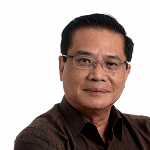This article was first published in The Straits Times on April 26, 1993
When the Taiwanese government set up the Straits Exchange Foundation (SEF) to handle ties with China two years ago, it was only natural that it should turn to Mr Koo Chen-fu to head the body.
The 76-year-old tycoon and philanthropist was not only a senior adviser to President Lee Teng-hui and chairman of the National Association of Industry and Commerce, but he had also played a key role in establishing Taiwan's trade and economic links around the world. In addition, as president of the Pacific Basin Economic Council, he was active in promoting international economic co-operation in the region.
Also, as a member of the ruling Nationalist Party's Central Standing Committee, he was regarded as Taiwan's top unofficial economic diplomat. His appointment reflected the importance Taipei attached to the growing ties with the mainland.
Mr Koo, in turn, demonstrated his own commitment by stepping down as chief executive officer of Taiwan Cement Corporation, the flagship company of his family's business empire, which comprises 91 companies in everything from aviation to insurance, to devote time to the task.

"To do something for the well-being of the Chinese people from both sides of the Taiwan Straits" was of greater importance than anything he had done before, he said.
Born into a wealthy Taiwanese family, Mr Koo was only 20 and still in university studying law and economics when his father died, leaving him seven companies.
But the young Mr Koo apparently believed that simply taking over the companies without himself knowing how to run them would make him a boss only in name.
So after graduating, he left the companies in the care of managers and went to Japan, which then ruled Taiwan, to work as a junior staffer in a Tokyo company in order to learn the basics of doing business from scratch.
Observers say that he has displayed the same humility in the years since, both in his management style and in his personal life.
Although he is one of Taiwan's wealthiest and most influential businessmen - besides extensive foreign contacts, he is also close to Taiwanese leaders - he is known for never flaunting his wealth or abusing his power.
He is also said to be an ardent fan of Chinese opera, a love he picked up from his father.
Early in the century when the Japanese occupied Taiwan, the senior Mr Koo built an opera theatre in Taiwan and frequently invited troupes from China to perform there. He reportedly did this to make sure his children and fellow Taiwanese did not forget the old Chinese values depicted in the operas.
Since taking on the SEF post, Mr Koo has left the running of his companies largely to his two sons (he also has three daughters) and other family members.
He is said to be very closely involved in the preparations for the historic meeting, beginning here tomorrow with the SEF's China counterpart, the Association for Relations Across the Taiwan Straits (Arats).
This is the first formal, public meeting between the two sides since 1949 when the communists took over the mainland and the nationalists were left ruling over Taiwan, although both insist Mr Koo and his Arats counterpart are acting in a "non-official, non-political" capacity.
According to reports, he has made it a point to attend the SEF's weekly meetings in Taipei, despite spending a third of his time travelling overseas, and is conscientious about doing his homework for the meeting.
This includes collecting all relevant information and talking to as many people as possible.
Besides his time, Mr Koo, who was founder and first chairman of Taiwan's stock exchange, has also given a great deal of money towards furthering ties with the mainland.
For example, when the SEF was first set up, he donated more than NT$20 million (S$1.3 million) to help finance its activities. These included social, cultural and economic visits between the peoples from the two sides.
Earlier, he contributed US$1 million (S$1.6 million) to a fund launched by the Nationalists to help victims of the Tiananmen incident, and another US$200,000 for flood victims.

